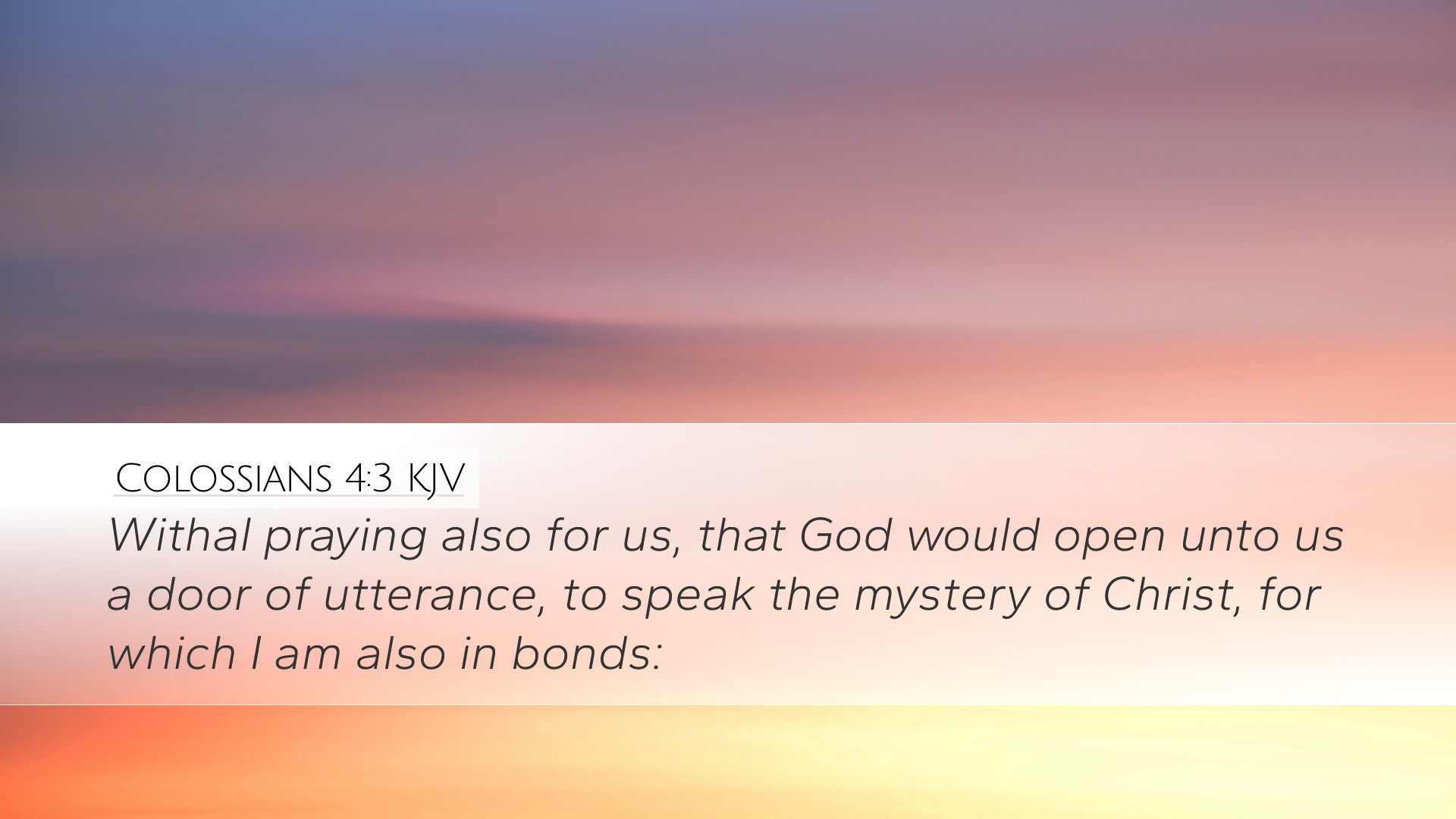Old Testament
Genesis Exodus Leviticus Numbers Deuteronomy Joshua Judges Ruth 1 Samuel 2 Samuel 1 Kings 2 Kings 1 Chronicles 2 Chronicles Ezra Nehemiah Esther Job Psalms Proverbs Ecclesiastes Song of Solomon Isaiah Jeremiah Lamentations Ezekiel Daniel Hosea Joel Amos Obadiah Jonah Micah Nahum Habakkuk Zephaniah Haggai Zechariah MalachiColossians 4:3
Colossians 4:3 KJV
Withal praying also for us, that God would open unto us a door of utterance, to speak the mystery of Christ, for which I am also in bonds:
Colossians 4:3 Bible Commentary
Commentary on Colossians 4:3
Verse Reference: Colossians 4:3 (KJV) - "Withal praying also for us, that God would open unto us a door of utterance, to speak the mystery of Christ, for which I am also in bonds."
Introduction
The Apostle Paul, in his Epistle to the Colossians, emphasizes the importance of prayer and the necessity of divine assistance in the proclamation of the Gospel. This verse reflects Paul's deep concern for effective communication of God's Word and his desire for partnership in prayer from the Colossian believers.
Insights from Commentaries
Matthew Henry's Commentary
Matthew Henry highlights that Paul's appeal for prayer is rooted in his conviction of the sovereignty of God in evangelism. Paul mentions “the mystery of Christ,” expressing that the Gospel is a profound revelation of God’s plan for salvation, which demands clarity and boldness in declaration. Henry emphasizes that even the most gifted and anointed ministers need the support of prayer.
He addresses the notion of a “door of utterance,” interpreting it as an opportunity to speak freely and openly about Christ. Henry underscores that prayer is not merely an act of communication with God, but a means through which God acts to open hearts and opportunities for His message.
Furthermore, in considering Paul's imprisonment (“for which I am also in bonds”), Henry notes that trials can enhance the power of a testimony. A faithful witness during suffering may indeed bring glory to God, illustrating the transformative impact of the Gospel even in adverse situations.
Albert Barnes' Notes on the Bible
Albert Barnes complements Henry's insights by focusing on the aspect of "praying for us." He notes that this plea is not merely for physical release from imprisonment but for spiritual efficacy in preaching. Barnes emphasizes that prayer for ministers is essential for their protection and effectiveness, implying that pastors and leaders must not only pray for their congregations but also invite prayer support in their missions.
Barnes further explores the metaphor of an “opened door” as a symbolic representation of opportunities. He illustrates that just as Paul sought God to grant him opportunities to share the Gospel message, so too should modern believers seek opportunities to witness to others. The desire for a door to be opened signifies an expectation that God is at work, which encourages believers to be active participants in the Great Commission.
Adam Clarke's Commentary
In his analysis, Adam Clarke elaborates on the significance of the phrase "mystery of Christ." He expounds that the Gospel is considered a mystery in that it unveils truths that were hidden but now revealed through Christ’s life, death, and resurrection. Clarke emphasizes that understanding this mystery requires spiritual insight, which highlights the necessity of prayer for revelation.
Clarke also draws attention to the urgency in Paul’s request for prayer. He notes that just as the Apostles were commissioned to preach the good news with boldness, contemporary believers should cultivate a consistent culture of prayer, recognizing the need for divine intervention for impactful ministry. He reflects on how every believer is called to be a part of this mission, praying specifically for those who preach the Word.
Theological Implications
The theological implications of Colossians 4:3 are profound. This verse brings forth several important themes:
- The Dependency on Divine Help: The verse showcases the Apostle's reliance on God’s power for effective ministry.
- Corporate Prayer: It calls for the Church to engage in corporate praying for their leaders, recognizing the communal aspect of the Christian faith.
- Openness to the Mystery of God: The mystery of Christ urges both preachers and listeners to seek a deeper understanding of God’s revelation through the Holy Spirit.
- Endurance in Adversity: Paul’s request serves as a reminder that even in difficult circumstances, prayer can lead to meaningful ministry.
Application for Pastors and Theologians
For pastors and theologians, Colossians 4:3 presents a compelling call to engage in prayer more profoundly, not only in their personal time but also as part of their corporate ministry efforts. The insights drawn from the commentaries suggest several approaches:
- Prioritize Prayer: Create spaces within church life that prioritize prayer for leaders and missionaries.
- Encourage Congregational Involvement: Involve the congregation in praying for the “doors of utterance” to open in their own communities.
- Teach on the Mysteries of Christ: Delve deeply into teaching that illuminates the mystery of Christ, fostering a culture of learning and discovery among believers.
- Prepare for Trials: Instill a readiness to testify during trials, drawing strength from the expectation of God’s enabling.
Conclusion
Colossians 4:3 is a potent reminder of the power of prayer, the urgency in proclaiming the Gospel, and the necessity of divine assistance. As we reflect on this verse, may it inspire a deeper commitment to intercessory prayer and a greater dependence on God's Spirit in all ministries of the Word. The insights gained from the commentaries encourage not only personal reflection but also action on behalf of the local and global church to faithfully carry forth the mystery of Christ.


